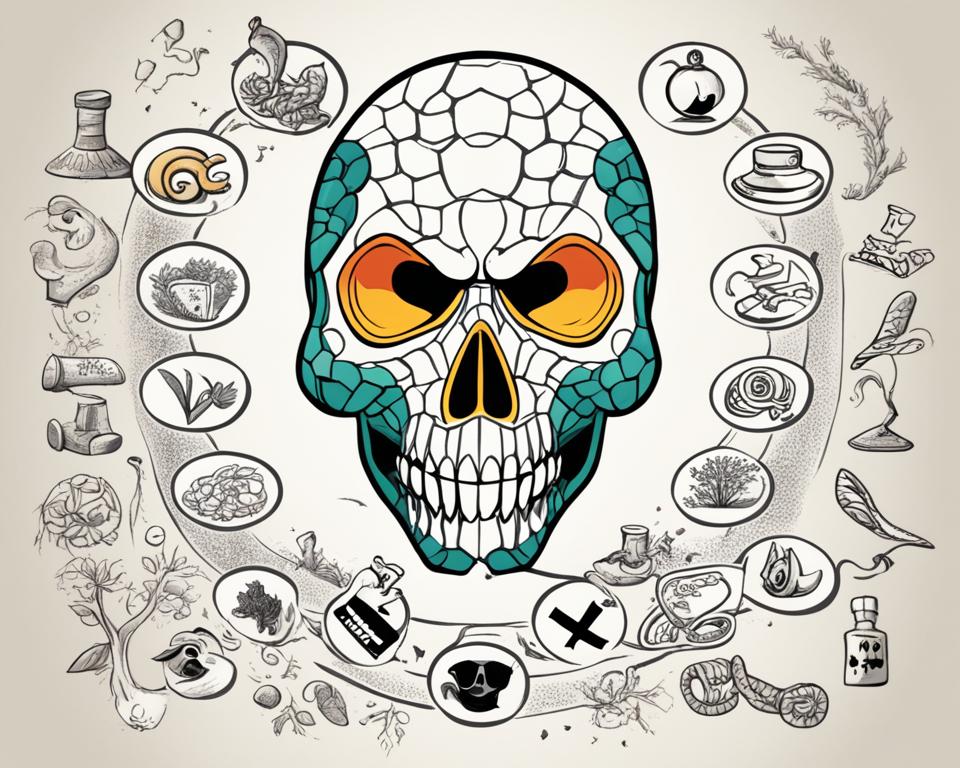Toxic behavior can have a detrimental impact on both ourselves and those around us. It’s essential to recognize and address our toxic traits for personal growth and self-improvement. That’s where the Toxic Traits Test comes in. This powerful personality assessment tool is designed to help individuals identify their negative traits, allowing them to take steps towards positive change.
With 40 thought-provoking items on a 5-point scale, the Toxic Traits Test comprehensively evaluates major toxic traits such as arrogance, argumentativeness, meanness, disrespectfulness, judgmentalism, control, manipulation, and selfishness. By taking this behavior evaluation quiz, you’ll be able to gain valuable insights into your own behavior patterns and identify areas for improvement.
Key Takeaways:
- The Toxic Traits Test is a powerful assessment tool for identifying and understanding negative behaviors.
- Recognizing toxic traits is the first step towards personal growth and self-improvement.
- The test covers major toxic traits such as arrogance, argumentativeness, meanness, disrespectfulness, judgmentalism, control, manipulation, and selfishness.
- By reflecting on your behaviors and addressing toxic traits, you can build healthier relationships.
- The Toxic Traits Test can aid in cultivating mindfulness, self-awareness, and positive change.
Understanding Toxic Traits and Their Impact
Toxic traits are an inherent part of human behavior, but they can have a detrimental effect on relationships and overall well-being. It is essential to recognize and address these negative behaviors for personal growth and the cultivation of healthier relationships. Common toxic traits include:
- Judgmentalism: Forming negative and harsh opinions of others without considering their perspective.
- Control: The need to dominate and exert power over others, often disregarding their autonomy and boundaries.
- Manipulation: Using deceit or indirect tactics to influence others or gain personal advantage.
- Selfishness: Prioritizing personal needs and desires over the well-being and happiness of others.
These toxic behaviors can harm individuals, create toxic environments, and strain relationships. Recognizing and addressing these toxic traits is a crucial step towards personal growth and self-improvement.
The Toxic Traits Test provides individuals with a tool to identify and understand their own negative behaviors, facilitating self-reflection and growth.
By taking the initiative to confront and rectify toxic traits, individuals can cultivate healthier relationships, improve their overall well-being, and contribute to a more positive environment.
Toxic Traits and Their Impact
| Toxic Trait | Impact |
|---|---|
| Judgmentalism | Creates a negative and critical atmosphere, damaging relationships and self-esteem. |
| Control | Erodes trust, stifles individuality, and limits the development of healthy partnerships. |
| Manipulation | Undermines trust, fosters resentment, and compromises authentic connections. |
| Selfishness | Breaks down mutual support and generosity, fostering a self-centered environment. |
Recognizing and addressing toxic traits is an ongoing process that requires self-awareness, self-reflection, and a commitment to personal growth. By embracing self-improvement and taking steps to change negative behaviors, individuals can create a more positive future for themselves and those around them.
Signs of Toxicity and Self-Reflection
Toxicity is often characterized by a set of negative behaviors and behavioral patterns that can have a detrimental impact on relationships and overall well-being. Recognizing these signs is crucial for self-reflection and personal growth.
So, what are the signs of a toxic person? Here are some common indicators:
- Judgmental: Toxic individuals tend to pass harsh judgments on others, often criticizing or belittling them.
- Control issues: They exhibit a strong need for control and dominance over others, often imposing their opinions and desires.
- Lack of empathy: Toxic people struggle to understand or relate to the feelings and experiences of others, showing little compassion or understanding.
- Disrespecting boundaries: They disregard personal boundaries, invading the physical or emotional space of others without consent.
- Manipulation or abuse: Toxic individuals engage in manipulative tactics to exert control over others, often resorting to emotional or physical abuse.
In order to address toxic traits and behaviors, self-reflection plays a crucial role. Taking the time to honestly assess one’s own actions and attitudes is essential for personal growth and positive change.
Self-reflection is the mirror through which we see the true reflection of our behaviors and their impact on others.
An effective way to gain insights into our own behaviors is by seeking feedback from trusted individuals who can provide honest observations and perspectives. Their input can help us identify toxic traits that may be affecting our relationships and overall well-being.
The Toxic Traits Test serves as a valuable tool for self-reflection and identifying toxic behaviors. By taking this assessment, individuals can gain a deeper understanding of their negative patterns and take steps towards personal growth and transformation.
The Toxic Traits Test: A Tool for Self-Reflection
The Toxic Traits Test is a comprehensive assessment that consists of 40 items designed to evaluate major toxic traits. The test covers a range of behaviors, including arrogance, argumentativeness, meanness, disrespectfulness, judgmentalism, control, manipulation, and selfishness.
By answering the questions honestly, individuals can uncover their own toxic traits and gain valuable insights into areas for self-improvement. This self-reflection process is instrumental in breaking free from negative behavioral patterns and cultivating healthier relationships.
Overcoming Toxicity and Becoming a Better Person
Recognizing toxic behaviors is the first step towards overcoming toxicity and embarking on a journey of personal growth and behavior change. It’s crucial to cultivate mindfulness and self-awareness to catch and address toxic tendencies.
Seeking support from a professional and building a strong support system can significantly aid in the process of behavior change. Mental health professionals offer guidance and strategies to navigate through toxic patterns and develop healthier behaviors. Surrounding yourself with individuals who understand and encourage your personal growth journey creates a nurturing environment for change.
Engaging in regular self-reflection is vital in understanding the thoughts and actions that contribute to toxic behavior. By reflecting on triggers, stressors, and control issues, individuals can gain insights into the root causes of toxicity and implement effective strategies to redirect their behavior.
Over time, with self-reflection and determination, individuals can gradually let go of toxic traits and replace them with positive ones. This personal growth journey not only improves one’s own well-being but also strengthens and builds healthier relationships with others.
By embracing personal growth and adopting a commitment to change, one can stop being toxic and develop into a better version of themselves. Through continuous self-improvement and the support of a strong network, individuals can create a mindful and compassionate approach to life, fostering a positive impact on themselves and those around them.
Conclusion
Identifying and addressing toxic traits is a crucial part of personal growth and self-improvement. The Toxic Traits Test provides individuals with a powerful tool to reflect on and understand their own negative behaviors. By recognizing and taking proactive steps to change toxic traits, individuals can build healthier relationships and create a more positive environment for themselves and those around them.
Embracing self-improvement is a journey that requires commitment and dedication. By actively working on eliminating toxic behaviors, individuals open the door to personal growth and a more fulfilling life. Addressing toxic traits not only improves one’s relationships but also enhances overall well-being and happiness.
Self-awareness, combined with a willingness to change, is the foundation for transforming negative behaviors into positive ones. The Toxic Traits Test serves as a catalyst for self-reflection, helping individuals gain insight into their toxic tendencies, such as arrogance, argumentativeness, meanness, disrespectfulness, judgmentalism, control, manipulation, and selfishness.
By using the Toxic Traits Test and taking proactive steps towards self-improvement, individuals have the power to overcome toxicity, build healthier relationships, and create a more positive and fulfilling life experience.
FAQ
What is the Toxic Traits Test?
The Toxic Traits Test is a personality assessment tool designed to identify negative traits and toxic behaviors. It consists of 40 items that cover major toxic traits such as arrogance, argumentativeness, meanness, disrespectfulness, judgmentalism, control, manipulation, and selfishness.
Why is it important to address toxic traits?
Toxic traits, although part of being human, can have a negative impact on relationships and overall well-being. Common toxic traits include being judgmental, controlling, manipulative, and selfish. These behaviors can harm others and create toxic environments. Recognizing and addressing these toxic traits is crucial for personal growth and healthier relationships.
How can I recognize if I have toxic traits?
Toxic people exhibit harmful behaviors consistently. Signs of toxicity include being judgmental, having control issues, lacking empathy, disrespecting boundaries, and engaging in manipulation or abuse. Engaging in self-reflection and asking for feedback from trusted individuals can provide insights into personal behaviors. The Toxic Traits Test serves as a tool for self-reflection and identifying toxic traits.
How can I overcome toxic traits and become a better person?
Recognizing toxic behaviors is the first step towards overcoming toxicity. It’s important to cultivate mindfulness and self-awareness to catch and change toxic tendencies. Seeking support from mental health professionals or a support system can aid in behavior change. By reflecting on one’s thoughts and actions, individuals can start noticing triggers, stressors, and control issues that contribute to toxic behaviors. Over time, with self-reflection and determination, one can become a better person and build healthier relationships.
How does the Toxic Traits Test help with personal growth?
The Toxic Traits Test provides individuals with a tool to reflect on and understand their own negative behaviors. By recognizing and taking steps to change toxic traits, individuals can build healthier relationships and create a more positive environment. Embracing self-improvement and a commitment to change can lead to a happier and more fulfilling life.


